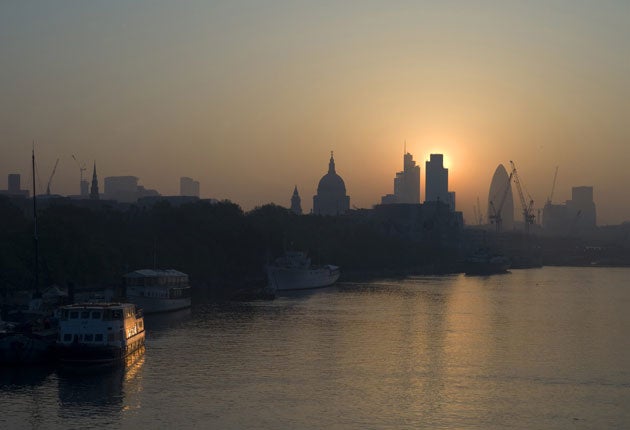Anti-smog buildings could be the future, as pollution soars
Britain may face EU courts over poor air quality, but tests on new 'sponge-like' materials offer hope

Your support helps us to tell the story
From reproductive rights to climate change to Big Tech, The Independent is on the ground when the story is developing. Whether it's investigating the financials of Elon Musk's pro-Trump PAC or producing our latest documentary, 'The A Word', which shines a light on the American women fighting for reproductive rights, we know how important it is to parse out the facts from the messaging.
At such a critical moment in US history, we need reporters on the ground. Your donation allows us to keep sending journalists to speak to both sides of the story.
The Independent is trusted by Americans across the entire political spectrum. And unlike many other quality news outlets, we choose not to lock Americans out of our reporting and analysis with paywalls. We believe quality journalism should be available to everyone, paid for by those who can afford it.
Your support makes all the difference.As health officials assessed the impact of potentially dangerous levels of smog across the country at the start of the weekend, an invention that turns buildings into pollution-absorbing "sponges" could offer help in the future.
High levels of pollution are expected to affect much of Britain, according to officials from the Department for Environment, Food and Rural Affairs, with London, Yorkshire, and the east, south-east and north-west of England all forecast to be badly hit.
The latest smog means the UK could face punishment for breaking EU air-pollution regulations. Recent smog alerts have put Britain over its annual limit for daily pollution. As the guidelines become legally binding in Britain in June, experts believe the UK could soon face court action.
Dr Frank Kelly, professor of environmental health at King's College London, said: "We've now had seven consecutive days of high or very high pollution in London, which we haven't seen since the heatwave in 2003. Britain was given an extension to meet EU limits for air pollution but it runs out on 11 June, leaving the UK vulnerable to being taken through the European courts. We're in the middle of the bank holiday, the weather is going to continue to be unseasonably warm, and with all the added traffic we're expecting to see at least another two to three days of this."
Health experts warned yesterday that asthma sufferers and those with respiratory conditions are at increased risk. Cher Piddock, a nurse for the Asthma UK advice line, said: "With the hot weather and smog set to continue through the weekend, people with asthma are at increased risk of an attack. As around two-thirds tell us pollution triggers their condition, it's important people with asthma always carry their inhaler, avoid exercising outdoors and keep windows shut whenever possible."
Pollution problems in London have prompted the Mayor, Boris Johnson, to examine a new Spanish invention which turns buildings into pollution-absorbing sponges. Scientists at the Institute of Chemical Technology in Valencia have developed a substance that can be added to building surfaces such as glass, cement or ceramic tiles to remove pollution from the air by triggering chemical reactions. The substance, known as OFFNOx, uses sunlight, water and oxygen to transform the dangerous pollutant nitrogen dioxide into a harmless white coating that can be washed away by rain.
Nitrogen dioxide reacts in sunlight to form ozone, one of the pollutants prompting serious health concerns this week. But even unconverted it is linked to the onset of asthma and reduced lung function.
Currently available as a ceramic tile, OFFNOx has just completed trials in Barcelona, which is also affected by severe pollution.
Professor Hermenegildo García, of Universidad Politécnica de Valencia, whose team came up with the technology, said: "There are different alternatives – not to run cars with gasoline, or not to burn any fuels. But with the current technology, with all the cars and transportation, there is no other way than the one we have developed."
With the Olympics just a year away, methods to reduce pollution without banning cars from central London are being examined by the Mayor's team. Similar products are in development, and the London Borough of Camden recently trialled a paint to remove pollution through a comparable process. Dr Ben Barratt of King's College London, which ran the trial, said preliminary results were positive for some nitrous oxides, but warned that success depended on enough air coming into contact with the treated surface.
Dr Barratt said: "It's been proven in the lab. But in the real world, you're not going to be 100 per cent successful."
Join our commenting forum
Join thought-provoking conversations, follow other Independent readers and see their replies
Comments